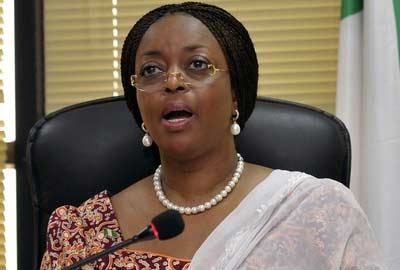New Petrol Price: How we arrived at N87 per litre — Alison-Madueke

Minister Of Petroleum Resources, Deziani Alison-Madueke
The Minister of Petroleum Resources, Diezani Alison-Madueke, said on Friday that the Federal Government settled for a N10 reduction from the retail pump price of petrol to maintain parity in the domestic pump price and the prevailing global crude oil prices.
The minister, who was guest on a radio programme monitored in Abuja, said since crude oil price began a downward slide since September 2014 government had been monitoring the movement to determine the appropriate time to intervene.
Br December, 2014 when the price averaged $56 per barrel, the Minister said the Petroleum Products Pricing Regulatory Agency, PPPRA pricing template showed that the level was equivalent to N97 per litre of the retail pump price in the country.
However, she said since the price was not equal to the open market pump price in Nigeria (that is landing cost plus distribution cost), government resolved to continue monitoring the movement for another bout two weeks.
This, the minister explained, was to ensure that the situation in global oil market stabilized, while the price volatility was not crashing too fast or beginning to go up suddenly.
“Government felt that last week was safe to adjust the price by N10 (from N97 to N87 per litre) to bring about that parity,” the Minister said.
In spite of the reduction, the minister said government would still have N2.50 to pay as subsidy on every litre of petroleum products sold in the country.
Government, she said, was satisfied that the N10 reduction was enough to give Nigerians some impact on their daily lives considering the number of litre of petrol they need to buy from the filling stations.
Unlike what obtains in other places, like the U.S., the minister said Nigeria was paying subsidy Nigeria was still paying subsidy, even with the downward trend of oil prices, because there they were producing internally for Americans.
Prior to the drop in oil prices, U.S. was heavily importing Nigeria’s crude oil.
Today, she said the U,S. was utilizing its high volumes of shale oil and gas production, which the government is subsidizing heavily to ensure that all its needs for crude oil was produced locally.
Nigeria, on the other hand, was importing against the global import prices, which government was heavily subsidizing by about N56, while consumers paid N97 per liter.
“While America crashed its petrol price immediately crude oil price began to drop, it took some time for Nigeria to do so, because already government was subsidizing,” she said.
According to her, where people would have seen reduction was already taken up by government by paying that N56 Naira on top to get the level where N97 pump price was equivalent to the reduction in the global oil price.
The minister said slide in global crude oil prices did not impact diesel, because the price of the commodity has since been deregulated and not controlled by government.
“It is being moderated by the swings of the free market indices of supply and demand relative to whatever cost it is being procured abroad – global prices,” she said. “Government has no business with diesel price.”.
Where government finds some manipulations in the prices in the markets, she said government would not hesitate to sanction with culprits, in terms of appropriate regulation.
On compliance to the new price regime at the filling stations, Mrs. Alison-Madueke said the Department of Petroleum Resources, DPR was monitoring the situation regularly to maintain sanity.
She said marketers have no reason to indulge in profiteering, as government would still be recovering subsidy cost for at least 40 days for those marketers who have already brought in stock of products to distribute before the change in price.
On kerosene, she said the price has remained high because of its landing, adding that by the time it is moved to the hinterland, the transportation costs (bridging cost) raises the final price.
She attributed the high cost of transportation cost in the pricing template to the resort to products distribution by road due to the high incidence of pipelines vandalism, sabotage, stealing and insincerity by some marketers.
“In some locations, like between Warri and Port Harcourt, ferries and boats are used to move crude oil, because the pipelines have been vandalized through increased cases of bunkering.
“These put additional cost, apart from the activities of unscrupulous marketers, who indulge in profiteering through illegal price increases and transportation cost,” she said. While appealing to marketers, to eschew greed, which is fueling such behavior an think about the economy and the Nigerian people, she said government would seal up filing stations found to have breached the law.
Source Premium Times.


0 Comments:
Post a Comment
Subscribe to Post Comments [Atom]
<< Home